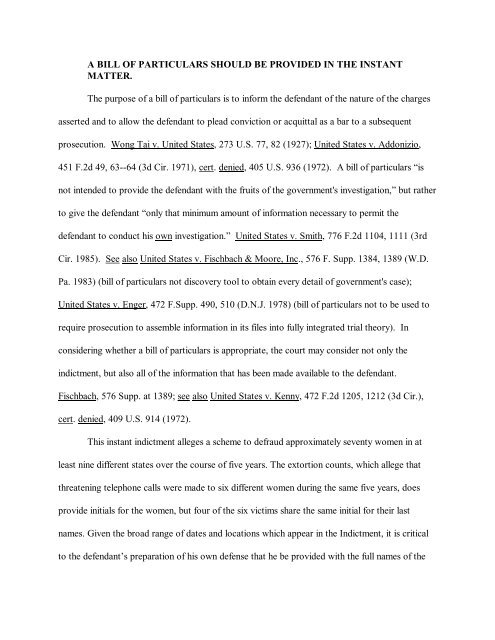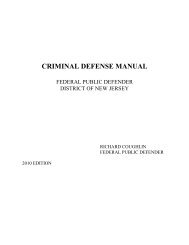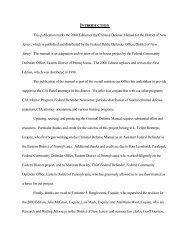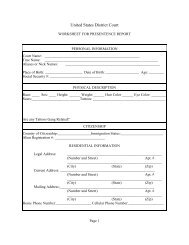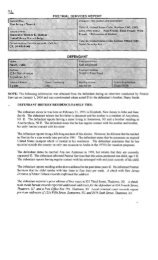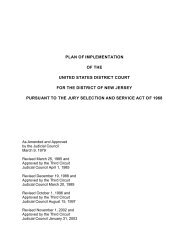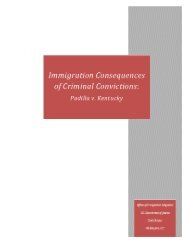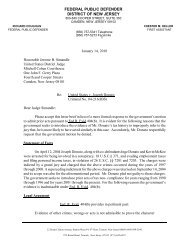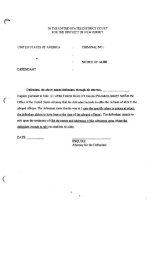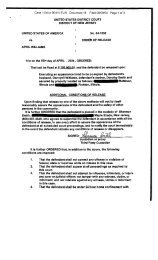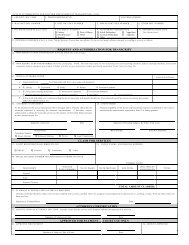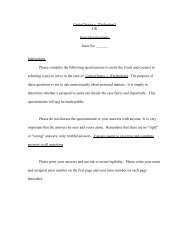Sample Motion for Bill of Particulars
Sample Motion for Bill of Particulars
Sample Motion for Bill of Particulars
You also want an ePaper? Increase the reach of your titles
YUMPU automatically turns print PDFs into web optimized ePapers that Google loves.
A BILL OF PARTICULARS SHOULD BE PROVIDED IN THE INSTANT<br />
MATTER.<br />
The purpose <strong>of</strong> a bill <strong>of</strong> particulars is to in<strong>for</strong>m the defendant <strong>of</strong> the nature <strong>of</strong> the charges<br />
asserted and to allow the defendant to plead conviction or acquittal as a bar to a subsequent<br />
prosecution. Wong Tai v. United States, 273 U.S. 77, 82 (1927); United States v. Addonizio,<br />
451 F.2d 49, 63--64 (3d Cir. 1971), cert. denied, 405 U.S. 936 (1972). A bill <strong>of</strong> particulars “is<br />
not intended to provide the defendant with the fruits <strong>of</strong> the government's investigation,” but rather<br />
to give the defendant “only that minimum amount <strong>of</strong> in<strong>for</strong>mation necessary to permit the<br />
defendant to conduct his own investigation.” United States v. Smith, 776 F.2d 1104, 1111 (3rd<br />
Cir. 1985). See also United States v. Fischbach & Moore, Inc., 576 F. Supp. 1384, 1389 (W.D.<br />
Pa. 1983) (bill <strong>of</strong> particulars not discovery tool to obtain every detail <strong>of</strong> government's case);<br />
United States v. Enger, 472 F.Supp. 490, 510 (D.N.J. 1978) (bill <strong>of</strong> particulars not to be used to<br />
require prosecution to assemble in<strong>for</strong>mation in its files into fully integrated trial theory). In<br />
considering whether a bill <strong>of</strong> particulars is appropriate, the court may consider not only the<br />
indictment, but also all <strong>of</strong> the in<strong>for</strong>mation that has been made available to the defendant.<br />
Fischbach, 576 Supp. at 1389; see also United States v. Kenny, 472 F.2d 1205, 1212 (3d Cir.),<br />
cert. denied, 409 U.S. 914 (1972).<br />
This instant indictment alleges a scheme to defraud approximately seventy women in at<br />
least nine different states over the course <strong>of</strong> five years. The extortion counts, which allege that<br />
threatening telephone calls were made to six different women during the same five years, does<br />
provide initials <strong>for</strong> the women, but four <strong>of</strong> the six victims share the same initial <strong>for</strong> their last<br />
names. Given the broad range <strong>of</strong> dates and locations which appear in the Indictment, it is critical<br />
to the defendant’s preparation <strong>of</strong> his own defense that he be provided with the full names <strong>of</strong> the
alleged victims in this case. The defendant further requests the conduct, date, place and substance<br />
<strong>of</strong> every alleged fraudulent act referred to in paragraphs 2 - 12 <strong>of</strong> the indictment, including the<br />
particulars acts relating to the “seventy women” referred to in paragraph 2. See United States v.<br />
Espy, 989 F.Supp. 17, 33-34 (D.D.C. 1997), rev’d on other grounds by United States v. Espy,<br />
145 F.3d 1369 (D.C. Cir. 1998). Without this in<strong>for</strong>mation, it will be impossible <strong>for</strong> the defendant<br />
to conduct his own investigation. Accordingly, the defendant respectfully requests that, pursuant<br />
to Federal Rule <strong>of</strong> Criminal Procedure 7(f), the government be required to disclose the full names<br />
<strong>of</strong> the alleged victims in this case.


